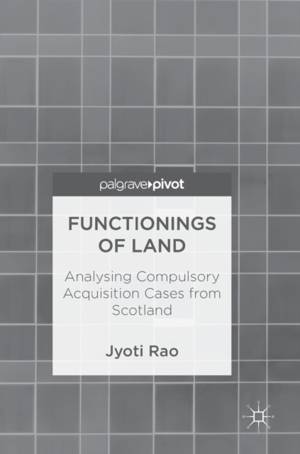
- Afhalen na 1 uur in een winkel met voorraad
- In januari gratis thuislevering in België
- Ruim aanbod met 7 miljoen producten
- Afhalen na 1 uur in een winkel met voorraad
- In januari gratis thuislevering in België
- Ruim aanbod met 7 miljoen producten
Functionings of Land
Analysing Compulsory Acquisition Cases from Scotland
Jyoti RaoOmschrijving
This book focuses on the 'functionings' and capabilities generated from land by their owners and the challenge in satisfactorily recreating these through the compensation paid in the case of compulsory acquisition of private land. These discussions initiate a new debate on the insufficiency of existing approaches to compensation that are ignorant of the losses of 'capabilities' and 'functionings'. The relationship between land, ownership and well-being of an individual is explained through the identification of various 'functionings' associated with the ownership of land in the context of Scotland.
Contemporary approaches to compensation, founded on the utilitarian argument, have led to dissatisfactory outcomes for the affected landowners. Discussions in this book shift the focus to equalizing the share of burdens and benefits for each individual member of the society, through equalization of human capabilities.
This book will be of value to development economists, researchers, policy makers and law makers concerned with compulsory acquisition of land.
Specificaties
Betrokkenen
- Auteur(s):
- Uitgeverij:
Inhoud
- Aantal bladzijden:
- 115
- Taal:
- Engels
Eigenschappen
- Productcode (EAN):
- 9789811314407
- Verschijningsdatum:
- 7/08/2018
- Uitvoering:
- Hardcover
- Formaat:
- Genaaid
- Afmetingen:
- 148 mm x 210 mm
- Gewicht:
- 303 g

Alleen bij Standaard Boekhandel
Beoordelingen
We publiceren alleen reviews die voldoen aan de voorwaarden voor reviews. Bekijk onze voorwaarden voor reviews.









